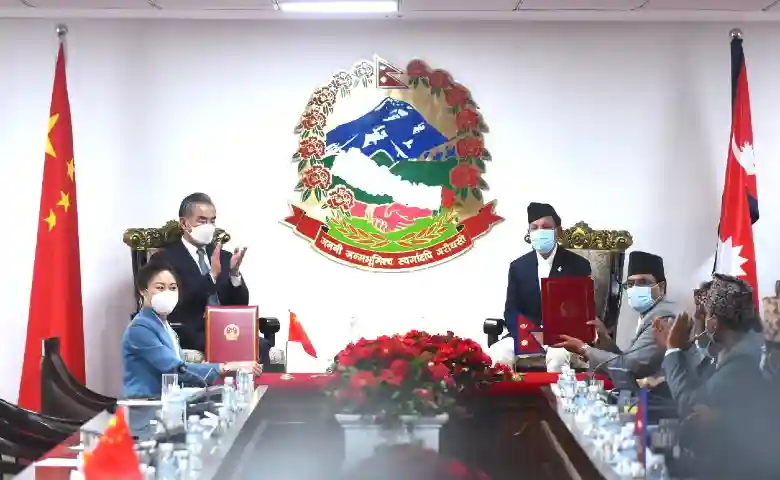Chinese foreign minister Wang Yi’s visit to Nepal, aimed at balancing power equations amid Kathmandu’s not-so subtle shift in policy towards Washington, especially after the Sher Bahadur Deuba government ratified the US led $500 million grant last month, has created “confusion.” The Chinese minister’s visit took place just a few weeks before a 25-member strong bipartisan Congressional delegation from the US is slated to visit Nepal.
The Kathmandu Post, in a report titled "Chinese minister wraps up Nepal visit with mixed signals and messages" said that the visit led to confusion as Nepal issued just one statement on Wang's visit compared to multiple ones released by Beijing.
The Nepalese foreign ministry statement did not mention anything on the Belt and Road Initiative even as Kathmandu and Beijing signed the pact in 2017. However, the statements issued by Beijing underscores the importance of the BRI projects in Nepal.
Though the Chinese foreign ministry statement noted that Beijing believes in sovereignty and that Wang expressed that China and Nepal have always supported, trusted and helped each other, the news organisation quoting a Nepalese diplomat said that "this is a typical Chinese style of pursuing diplomacy and threatening a third country by using the soil of the host country.”
A host of agreements between Nepal and China have been signed in the presence of Wang but according to KT, analysts said those were “customary” in nature.
China has already expressed its concern over the Millennium Challenge Corporation (MCC) grant, calling it “Pandora’s box.”
Also read: Report acknowledges that China has encroached Nepal's territory—BBC
“Wang Yi’s coming to Nepal was significant amid the MCC pact. It must be remembered that none of the political parties except the ones close to China voted against the MCC,” Yubaraj Ghimire, senior journalist and editor Of Deshsanchar.com told India Narrative. Incidentally, Nepal, which traditionally maintained its neutrality in foreign policy, backed the UN resolution demanding withdrawal of Russian troops from Ukraine. The move has been much appreciated by the West.
Blaming the US for “provoking conflict all over the world” and particularly, Beijing-based Global Times said that Washington “has tried to rope India into the anti-China mechanism and lure Nepal into the Millennium Challenge Corporation, an infrastructure aid deal to hedge against the China-proposed Belt and Road Initiative.”
The grant, aimed at improving road quality, increasing the availability and reliability of electricity, while facilitating cross-border electricity trade between Nepal and India, is being seen by Beijing as a move that would boost US’ grip over the Himalayan nation.
The US Government’s MCC pact was signed in September 2017 but the delay in its ratification by the Nepalese government had become a sore point between Kathmandu and Washington. Several protests have broken out in Nepal following the ratification of the $500 million grant.
After Washington set a deadline of February 28 for ratifying the pact, it was finally ratified on February 27.
Also read: Is Chinese foreign minister Wang Yi aiming to counter US influence in Nepal?
Almost every major political party in Nepal backed the MCC compact. Even the Communist Party of Nepal (Maoist Center) and the Communist Party of Nepal (Unified Socialist), both part of the ruling coalition – gave their nod to the pact. Both these parties had earlier resisted endorsement to the MCC compact.
Incidentally, this year also marks the 75th anniversary of the Nepal-US diplomatic ties and a slew of engagements between the two nations is expected to take place in the coming months.
According to the Kathmandu Post, the US has already extended an invitation to Deuba.
“The US card in Nepal is playing and the outcome of Wah Yi’s visit could have overarching ramifications, which would also impact South Asia,” Navita Srikant, foreign policy expert, who has been focusing on Nepal, told India Narrative.
“Nepal must play its cards carefully and strategically,” Srikant said. She also added that Wang’s India visit just before he arrived in Kathmandu should also be seen in the overall context of geopolitical play in the South Asian region.




















